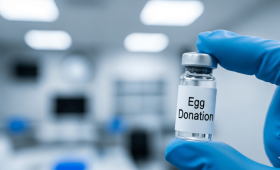A New Era in the Journey to Parenthood
Infertility is one of the most common health challenges of the modern era, posing significant emotional and physical difficulties for couples and individuals. Situations such as male-factor infertility, the risk of transmitting genetic diseases, or the desire for single parenthood can limit the hope of having children through traditional methods. In this context, modern reproductive medicine techniques like sperm donation offer a vital solution to overcome these challenges. Sperm donation allows individuals or couples with a lack of genetic material to turn their dreams of building a family into reality. For patients, particularly those from Turkey and neighboring countries, Cyprus stands out as a strategic hub offering legal, medical, and financial advantages. This report aims to provide a holistic guide for individuals considering IVF treatment with sperm donation, covering all stages of the process, cost structures, success rates, and legal aspects to help them make informed decisions.
The Medical and Legal Foundations of IVF with Sperm Donation
What is Sperm Donation and Who is it Suitable For?
Sperm donation is an assisted reproductive technology in which sperm from a genetically healthy donor is used to fertilize the recipient’s eggs in a laboratory setting, typically in cases where a man cannot have a child using his own sperm. This treatment is applicable under various indications. The primary indications include a lack of sperm production in the male partner (azoospermia), severe genetic damage to sperm, a high risk of transmitting hereditary genetic diseases to children, or repeated IVF treatment failures. Additionally, single women or female couples can also use this method in countries where legal regulations permit it. This method offers individuals and couples the opportunity to experience biological parenthood even when they cannot use their own genetic material.
A Step-by-Step Look at the Treatment Process
IVF with sperm donation is a multi-stage process that requires meticulous follow-up. Before starting the treatment, the recipient woman must undergo a comprehensive preliminary evaluation. This evaluation includes hormone analysis, ultrasonography, and infectious disease tests. These tests aim to determine the patient’s suitability for the treatment and to identify potential risk factors to maximize the chances of success.
One of the most crucial steps of the treatment is donor selection. According to legal regulations in Cyprus, donors must be anonymous. While clinics cannot share pictures or contact information of donors, donor codes can be provided for sperm imported from European sperm banks, allowing access to a limited profile of the donor. Donors undergo extensive health screenings, including for genetic and sexually transmitted diseases, which increases the safety of the treatment. After the donor is selected, the treatment process continues with the egg retrieval procedure. The female patient uses hormonal medication to stimulate egg development. Egg retrieval is a painless surgical procedure performed under sedation.
The retrieved eggs are fertilized in a laboratory using donor sperm through the Intracytoplasmic Sperm Injection (ICSI) method. ICSI increases the chance of fertilization by injecting a single sperm into the egg. To select the highest quality embryos, fertilized embryos are typically monitored for five days in advanced technology systems like Embryoscope Plus, and they are expected to reach the blastocyst stage. The developing embryos are then transferred into the recipient woman’s uterus in a painless procedure guided by ultrasound.

The Legal and Ethical Framework in Cyprus and Turkey
One of the most critical aspects of sperm donation treatment is the legal regulations in different countries. In Turkey, under the Turkish Penal Code No. 5237 and relevant Ministry of Health regulations, sperm, egg, and embryo donation are strictly prohibited. This prohibition is based on various reasons, including ethical and religious sensitivities, and it is impossible to perform such a treatment in Turkish IVF centers.
In contrast, Cyprus has adopted a very different legal approach. In Cyprus, donation treatments are legalized under Law No. 57/2014, “Law Regulating the Rules Concerning the Transplantation of Human Cells, Tissues, and Organs”. This law mandates donor anonymity , ensuring the donor’s identity remains confidential, which serves to legally protect both the patients and the future child. This legal framework makes Cyprus a safe and accessible destination for international patients seeking donation treatments.
The legal restriction in Turkey might seem like an obstacle for Turkish citizens at first glance, but the lineage regulations in the Turkish Civil Code bring a different dimension to this situation. According to Article 282 of the Turkish Civil Code, if a child is born within a marriage, the husband is considered the legal father. The donor’s genetic contribution does not legally establish a line of descent, and this ensures that the legal parents of a child born through donation are the spouses within the marriage. Therefore, if a Turkish couple legally undergoes donation treatment in Cyprus and has a child, the Turkish legal system recognizes and protects this child as a legal member of the family. This situation shows that the legal systems of Turkey and Cyprus create a complementary synergy for patients. This legal safeguard is of vital importance for Turkish citizens to consider this treatment with confidence.
Cost Analysis of IVF Treatment in Cyprus
Pricing of Basic Treatment Packages
IVF treatment with sperm donation in Cyprus offers a significant cost advantage compared to developed countries. On average, the basic package cost for this treatment ranges from €4,000 to €5,500. This basic fee typically includes core medical procedures such as egg retrieval, sedation, ICSI, embryo culture, and embryo transfer. Depending on the clinic, some centers may also include services like ultrasonography and consultation in the basic price.
Understanding the Full Cost with Mandatory Additional Expenses
When evaluating the cost of treatment, it’s important to recognize that the basic package price offered by clinics may not fully reflect the total cost. Often, there are additional expenses not included in this price that the patient must cover. This is a common practice not only in Cyprus but also in clinics in countries like the US and the UK.
One of the most significant additional costs is medication expenses. Hormonal drugs used to stimulate egg development are not included in the treatment price and constitute an extra cost item. The cost of these medications can range from $2,000 to $5,000, depending on the patient’s condition and treatment protocol. In the UK, this cost can be as high as approximately £1,700. Additionally, infectious disease tests required before the treatment are also subject to a separate fee.
Furthermore, accommodation and travel expenses for the duration of the stay in Cyprus should be added to the budget. All these additional costs can lead to a total expenditure higher than the basic package price initially seen. Therefore, potential patients should consider all items, including medication, tests, and living expenses, when planning their budget. This transparent approach is crucial for avoiding surprise costs and making the treatment process more predictable.
International Price Comparison and Cyprus’s Cost Advantage
Cyprus stands out internationally for the cost-effectiveness of its IVF treatment with sperm donation. The treatment costs are significantly lower, especially when compared to developed countries like the United States and the United Kingdom.
In the US, the average total cost for IVF with sperm donation, including medications and additional procedures, can exceed $20,000. In the UK, these costs start from £7,000. These figures are considerably higher than the basic package price of €4,000-€5,500 in Cyprus.
When other popular European destinations are examined, Cyprus’s cost advantage becomes even clearer. For example, in countries like Spain, the Czech Republic, Greece, Ukraine, and Russia, the cost of donor sperm adds an extra €200 to €1,500 on top of the general IVF program cost. In Cyprus, this additional cost is around €200-€500, and the total treatment cost is similar to or lower than other European countries.
The table below provides a comparative overview of average costs in an international context:
| Country | Average Treatment Cost | Additional Donor Sperm Cost | Estimated Total Cost |
| Cyprus | €4,000 – €5,500 | Included in the price | €4,000 – €5,500 + additional costs |
| USA | $13,000 | $300 – $1,600 | $19,350 – $22,350 |
| UK | £4,000 | £1,000 | £7,155 – £7,750 |
| Europe (Spain, Greece) | Variable | €500 – €1,500 | Variable |
This table clearly demonstrates the financial advantage that Cyprus offers. However, this cost advantage should not be the sole criterion; high success rates are another important factor that makes Cyprus an attractive destination.
Success Rates: A Data-Driven Approach
Factors Affecting Success Rates of Sperm Donation
Success rates in sperm donation treatment are not a single number. These rates vary significantly, primarily depending on the recipient woman’s age and egg quality. As a woman’s age increases, the number and quality of eggs decrease, which lowers the chance of obtaining a genetically normal embryo and increases the risk of failure. On the other hand, the use of young and high-quality donor sperm positively affects fertilization success and embryo quality. Additionally, the laboratory technology of the IVF center and the experience of the expert team are critical factors that directly influence success rates.
Pregnancy Rates with Sperm Donation in Cyprus
IVF centers in Cyprus report very high pregnancy rates for sperm donation treatment. These rates are presented in detail according to the recipient woman’s age. For instance, pregnancy rates can go up to 88-89% for women aged 20-29 , 85% for ages 30-34, 80% for ages 35-39, and 76% for ages 40-44. These data show that the treatment has a high potential for success, depending on the recipient woman’s age. However, it is crucial to note that these rates are “pregnancy rates” and do not mean the same as “live birth rates.” Pregnancy rates refer to a positive pregnancy test result, while live birth rates indicate the successful completion of the pregnancy and the birth of a baby. This distinction is a critical piece of information for patients to manage their expectations realistically.
The following table shows the average pregnancy rates with sperm donation in Cyprus by age group:
| Age group | Average Pregnancy Rate |
| 20 – 29 | 88% – 89% |
| 30 – 34 | 84% – 85% |
| 35 – 39 | 74% – 80% |
| 40 – 44 | 69% – 76% |
| 45+ | 60% – 74% |

Comparison with General IVF Success Rates in Turkey
Since sperm donation is not legal in Turkey, a direct comparison of success rates cannot be made, but general IVF success rates provide an important context. General IVF pregnancy rates in Turkey vary significantly depending on the woman’s age. The chance of pregnancy is 60-70% for women under 35, while this rate drops to 30% for those aged 38-40. For women over 43, the chance of success is approximately 5%. These data reveal that success rates decrease dramatically, especially in older age groups.
Why Does Donation Treatment Yield Higher Success?
The main reason for the high success rates achieved with sperm donation is the quality of the donor sperm. Donors, being young and having undergone extensive genetic screenings, provide genetically healthy and high-quality sperm cells. Issues such as male-factor infertility and age-related increases in sperm DNA damage are among the main reasons for failure in traditional IVF treatment. Sperm donation completely eliminates these problems.
This creates an important decision-making mechanism for patients. Choosing sperm donation treatment in Cyprus not only provides a cost advantage but also offers access to a much higher potential for success than what can be achieved with general IVF treatment in Turkey. Especially for couples with male-factor infertility or women of advanced age, this treatment is not just an alternative but a strategic option to maximize the chances of success. Even when compared to high-cost countries like the US or the UK, the balance of cost and success rates offered by Cyprus creates a unique advantage. This elevates Cyprus from being “a cheap alternative” to a “strategic destination offering a higher chance of success.”
International Perspective and Health Tourism Advantages
Turkey’s Role in Health Tourism
In recent years, Turkey has become a global leader in health tourism. Its geographical location provides easy access for patients from both Europe and the Middle East. The world-class and affordable health services in Turkey make it an attractive alternative for patients looking to avoid high healthcare costs in developed countries. Health tourism also contributes significant value to the economy, creates new employment opportunities, and offers a non-seasonal tourism potential.
A Strategic Collaboration Model Between Cyprus and Turkey
The prohibition of sperm donation in Turkey might lead to the misconception that potential patients must undergo the entire treatment process in Cyprus. However, establishing a strategic collaboration model between the health systems of Cyprus and Turkey can make the process more efficient for patients, both logistically and financially.
In this model, patients can complete the preliminary preparation stages—such as initial evaluation, necessary tests, use of hormonal medications, and ultrasonography monitoring—with expert doctors in Turkey. This approach allows patients to manage the preparation phase of their treatment in an environment closer to home and more culturally comfortable. A short trip to Cyprus would then suffice for the most critical and legally required stages of the treatment, namely sperm donation and embryo transfer. This method optimizes the time and accommodation costs spent throughout the entire process, easing the burden on patients. This holistic health tourism experience transforms Cyprus and Turkey from individual destinations into a complementary ecosystem for patients.
Conclusion and Recommendations: Tips for an Informed Decision
Sperm donation with IVF treatment opens a hopeful door for many individuals and couples dreaming of building a family. The analysis in this report shows that Cyprus stands out as a destination offering legal reliability, cost-effectiveness, and high success rates in this field. Treatment costs are significantly lower compared to countries like the US and the UK, and these costs are balanced with a higher potential for success than what can be achieved with general IVF rates in Turkey.
To take informed steps on this challenging journey, the following recommendations should be considered:
- Do Thorough Research: Clarify your total cost budget by considering the basic price packages offered as well as any additional expenses not included in the treatment, such as medications, tests, accommodation and travel.
- Seek Expert Consultation: Before beginning treatment, obtain both medical (obstetrician, urologist) and legal (family law attorney) consultation to fully understand the process. Understanding the legal protections in Türkiye is crucial for your peace of mind.
- Set Realistic Expectations: Remember that the success rates clinics report are often “pregnancy rates” and not “live birth rates.” Accept the fact that the most important factors in determining your chances of success are a woman’s age and egg quality.
- Adopt a Strategic Approach: You can make your treatment process more efficient and economical by completing the preliminary preparation phase with experts in Türkiye and then considering the model of traveling to Cyprus just for donation.
It’s important to remember that every decision made during this process is personal and sensitive. This report is intended as a general guide, and it’s recommended that you consult a healthcare professional and legal counsel before making any final decisions. We wish you the best and most confident steps in your family-building journey.



